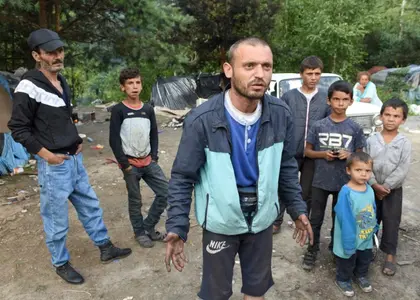In the latest in a spate of attacks on the Roma minority, a 30-year-old Roma woman was murdered on July 1 in Zakarpattia Oblast.
She was stabbed near a railway depot in the city of Berehove, 800 kilometers west of Kyiv, and escaped into the house of a local resident where she died of her wounds.
JOIN US ON TELEGRAM
Follow our coverage of the war on the @Kyivpost_official.
Although the police have not declared the killing to be ethnically motivated, the murder is another reminder of the vulnerability of Roma people to violence in Ukraine.
It follows on from the June 23 attack on a Roma community outside Lviv in western Ukraine, which left a 24-year-old man dead and four others injured, including a 10-year-old boy. Police said a far-right gang calling itself Sober and Angry Youth was responsible for the attack.
Since the murders are just a week apart, the commitment of the authorities to tackle violence against Roma people has once more been called into question.
Officially, fewer than 50,000 Roma live in Ukraine, but the unofficial number is thought to be up to five times higher. The attacks are part of an increasing pattern of far-right violence, which is then exploited by state-run media outlets in Russia to present Ukraine as a haven for neo-Nazis. With at least five attacks on a Roma community in the past two months alone, Ukraine has come in for criticism for failing to protect one of its most vulnerable minority groups.
Dunja Mijatović, the Commissioner for Human Rights of the Council of Europe, noted that “the (Ukrainian authorities’) response to violence and intimidation aimed against Roma has in many cases been indifferent or ineffective”.
Impunity to end?
Criminal proceedings have been opened into the case in Berehove, which is being categorized as murder. Zakarpattia regional police stated that they are working with the local Berehove police department to identify those involved.
In Lviv, officials also reacted quickly, identifying 14 suspects, the youngest still a minor, with the perpetrators potentially facing at least 15 years in prison. The authorities recovered several weapons at the scene, including a knife and an ax.
On June 27, the Chief of the National Police of Ukraine, Serhiy Knyazev, announced the set of new measures to prevent future attacks on Roma communities. These included patrols to establish the locations of their camps to ensure their safety.
However, the reaction of the police in these recent cases is exceptional. Roma communities are one of the most marginalized groups in Ukraine, and the growing atmosphere of impunity with which far-right groups have been operating has left the Roma vulnerable.
On June 7, the National Druzhyny militia carried out an attack on a Roma camp in Kyiv’s Holosiyivskiy Park. Even though they broadcast the incident live on Facebook, the police took little action when they finally arrived on the scene.
Another far-right group, named C14, violently attacked a Roma camp in the capital city in April. Only after a video of the attack was viewed thousands of times online did the police start to investigate the case.
Even more concerning have been the revelations that some far-right groups have received government funding.
According to an investigation by Hromadske Radio, C14-affiliated organizations, the C14 Sich and C14 Educational Assembly, received the Ministry of Youth and Sports grants for “national-patriotic education projects.” In total, they received over Hr 400,000 ($15,000) of taxpayer money to fund children’s events, including those to be held during a C14 Sich summer camp.
Blame game
At a press conference on June 25, the Chief of the State Security Service, Vasyl Hrytsak, suggested Russia could be behind the spate of violence, with the Kremlin aiming to stir up ethnic tensions in Ukraine. Interior Minister Arsen Avakov also said that the Lviv group was inspired by similar organizations in Russia.
However, non-governmental human rights organizations have placed the blame directly on the authorities.
Tanya Cooper, a Ukraine researcher at Human Rights Watch, stated in reaction to the Lviv attack that the lack of accountability enjoyed by violent far-right groups in the past led to a killing.
Human Rights Watch sent an open letter to the Interior Ministry and Prosecutor General Office on June 14, condemning the authorities’ “inadequate response,” which it said sent the “message that such acts are tolerated.”
Far-right groups also blame the government, but for the opposite reason. The head of C14, Yevhen Karas, stated that “when criminals go unpunished on Ukrainian soil,” his group does what the authorities should be doing. However, he denied having a role in the deadly June 23 attack on the Roma.
“We do not conduct systematic actions against (Roma people),” he said.
The spokesman of the National Druzhyny, Ihor Vdovin, similarly distanced the group from the youths who killed the Roma man in Lviv.
“We are not responsible for the actions of other nationalist forces”, Vdovin stated on June 27.
But the reaction of the authorities did receive some praise in the wake of the Lviv attack. Olha Vesnianka, a prominent human rights defender and representative of Chiriklo, a Roma radio station, wrote on Facebook that the response of the local government in particular has been “more adequate than (former Odesa Oblast Governor Mikheil) Saakashvili’s reaction to the attacks (on the Roma) in Odesa Oblast.”
She was referring to a case in 2016 in which mobs attacked a Roma community after the arrest of a Roma man in connection with the murder of a nine-year-old girl.
Officials did little to stop the incident, while then-Governor Saakashvili claimed to understand the anger directed towards the minority group – he argued that they had been involved in drug dealing.
You can also highlight the text and press Ctrl + Enter




